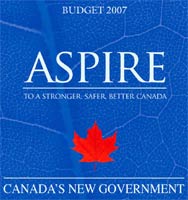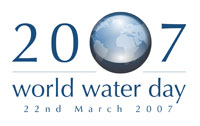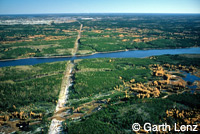
News |
- Ontario's Standard Offer Program
- Budget 2007: Climate Plan Lacking
- G8 + 5 Meet on Climate Change
- Responses - 2007 Pre-Election Survey
- March 22nd - Celebrate World Water Day 2007!
- Manitoba Water Council Announced
- Record Year for Freedom of Information
- Manitoba Cabinet Reviews Wuskwatim Licence
- Funds For East-West Grid Questioned
- Call for Protection of Ontario's Boreal Forest
- Minnesota Legislates Renewable Energy
- Canada and Manitoba Renew Agreement
| Ontario's Standard Offer Program | 28 March 07 |
 The Ontario government announced February 22 that it is increasing the amount of clean, green energy used to power Ontario's electricity grid with 22 new renewable energy projects. These are the first projects awarded under Ontario's Renewable Standard Offer Program (SOP), which allows small, renewable electricity generators to supply energy to the grid. The Ontario government announced February 22 that it is increasing the amount of clean, green energy used to power Ontario's electricity grid with 22 new renewable energy projects. These are the first projects awarded under Ontario's Renewable Standard Offer Program (SOP), which allows small, renewable electricity generators to supply energy to the grid. SOP projects must generate electricity from wind, solar photovoltaic (PV), thermal electric solar, renewable biomass, biogas, biofuel, landfill gas or waterpower and have installed capacity less than 10 megawatts (MW). The program intends to make participation in the energy market easier and supports Ontario renewable energy targets. Ontario's SOP program is expected to add 1,000 megawatts of clean energy to the grid over ten years, and is similar to programs in both Canadian provinces and US states. The contracts awarded in February 2007 involve four renewable "fuels" - solar, waterpower, biomass and wind and range in size from a 3 kilowatt residential solar photovoltaic installation to a 10 megawatt wind farm. Total capacity for the first contracts will be more than 140 megawatts - enough to supply over 30,000 homes. A further 58 applications have already been submitted; contracts will be awarded as they are evaluated. View the February 27, 2007 Government of Ontario press release View a Backgrounder on Ontario's Standard Offer Program View a list of the first contracts under Ontario's Standard Offer Program Visit the Ontario Power Authority for more information Sources: Government of Ontario, Ontario Power Authority
|
|
| Budget 2007: Climate Plan Lacking | 26 March 07 |
 Canada's Green Budget Coalition lamented the 2007 budget "does not provide adequate funding nor fiscal measures for the "massive scale-up of effort" which the Commissioner of the Environment and Sustainable Development emphasized [were] necessary to properly address climate change, in her 2006 Report." Canada's Green Budget Coalition lamented the 2007 budget "does not provide adequate funding nor fiscal measures for the "massive scale-up of effort" which the Commissioner of the Environment and Sustainable Development emphasized [were] necessary to properly address climate change, in her 2006 Report."Dale Marshall of the David Suzuki Foundation summed up the budget, "this federal budget largely recycles the previous government's climate change programs, only with less money." Gaile Whelan Enns, director of Manitoba Wildlands, told CBC Winnipeg, "There is not enough here for Lake Winnipeg. When funds for protected areas and lands planning north of 60 is provided, then Ottawa needs to consider how it will provide similar funds for Manitoba's east side boreal regions. The Budget also references a National Water Strategy. Canada also needs a National Water Policy." Some environmental measures were warmly received:
Visit Government of Canada's homepage Budget 2007 (See environmental section) View March 19, 2007 Green Budget Coalition release View Green Budget Coalition, Recommendations for Budget 2007: Opportunities for a Greener Canada (PDF) View March 19, 2007 David Suzuki Foundation release View March 15, 2007 Canadian Centre for Policy Alternatives (CCPA) release View CCPA Alternative Federal Budget 2007: Strength in Numbers (PDF) Sources: CBC, Green Budget Coalition, David Suzuki Foundation
|
|
| G8 + 5 Meet on Climate Change | 26 March 07 |
 Environment ministers of the Group of Eight (G8) industrialized nations, and officials from leading developing countries met in Potsdam, Germany March 15-17, 2007 to prepare for a June 2007 G8 summit when climate change will be a major topic. Environment ministers of the Group of Eight (G8) industrialized nations, and officials from leading developing countries met in Potsdam, Germany March 15-17, 2007 to prepare for a June 2007 G8 summit when climate change will be a major topic.Besides environment ministers from the G8 (Germany, United States, Britain, France, Italy, Canada, Japan and Russia), the meeting also included China, India, Brazil, Mexico and South Africa. German Environment Minister Sigmar Gabriel noted that consensus was reached on many issues, including a general acceptance of the scientific explanation for the causes of global warming. The fact that delegates were able to find common ground reflects a significant shift in the position of the US, which for years has questioned reliability of scientific findings showing man-made pollution, is responsible for the planet's warming. A group of 40 German and international non-governmental organizations (NGOs) presented a joint G8 policy paper at the summit that focused on climate change policy, but also included demands related to biodiversity, investment policy, intellectual property rights, development in Africa and debt cancellation. View the March 17, 2007 Reuters article View the March 17, 2006 Deutsche Presse-Agentur article on Monsters and Critics View the March 18, 2007 Canadian Press article on Canada.com View the March 17, 2007 article on Bloomberg.com View the G8 NGO policy paper, Testing the Credibility of the Powerful:Concrete Action for Environment and Development! (PDF) Sources: Reuters, Deutsche Presse-Agentur, Canadian Press, Bloomberg.com
|
|
| Responses - 2007 Pre-Election Survey | 22 March 07 |
 Three of four Manitoba political parties have provided responses to Manitoba Wildlands' pre-election survey. Three of four Manitoba political parties have provided responses to Manitoba Wildlands' pre-election survey.Responses from the governing New Democratic Party (NDP) will be posted when received; answers from the Progressive Conservatives, Liberals and Greens have all been forwarded to Manitoba Wildlands. Answers to this and previous Manitoba election surveys are posted on the Manitoba Wildlands web site, government page. Uncertainty regarding timing of both provincial and federal elections this year, and increasing public concern about Manitoba's environment lead to Manitoba Wildlands decision to issue a 'pre' election survey. The 2007 survey includes more categories of questions, and more short answer questions. The aim is to encourage Yes, or No answers. View Manitoba Wildlands' 2007 pre-election survey questions and responses View Manitoba Wildlands March 1, 2007 - Manitoba Pre-Election Survey Sent to Politicians Visit Manitoba Wildlands' Elections page Source: Manitoba Wildlands
|
|
| March 22nd - Celebrate World Water Day 2007! | 21 March 07 |
 'Coping with Water Scarcity' is the theme for World Water Day 2007, celebrated each year on March 22nd. This year's theme reflects recent studies by the UN Food and Agriculture Organization (FAO). The studies indicate two-thirds of the world's population may be living with water shortages by 2025. 'Coping with Water Scarcity' is the theme for World Water Day 2007, celebrated each year on March 22nd. This year's theme reflects recent studies by the UN Food and Agriculture Organization (FAO). The studies indicate two-thirds of the world's population may be living with water shortages by 2025.Water use in the last century grew at more than twice the rate of population. Agriculture is the number-one user of water worldwide, accounting for 70% of all freshwater withdrawn from lakes, waterways and aquifers. The figure is closer to 90% in several developing countries, where most of the world's irrigated farmlands are located. Coping with water scarcity requires addressing a range of issues, from protection of the environment and global warming to equitable distribution of water for citizens. Even people in areas with plenty of freshwater experience water scarcity when they are unable to gain access to enough water for their basic needs. The main World Water Day ceremony will take place at the headquarters of the Food and Agriculture Organization (FAO) in Rome, Italy. Experts from around the globe will address water scarcity. Visit the World Water Day 2007 website Visit the World Water Day website Visit the Council of Canadians Take Action for Water website View the February 14, 2007 Bloomberg.com article View the February 14, 2007 United Nations FAO press release View the March 14, 2007 Western Catholic Reporter article Sources: World Water Day, FAO, Blomberg.com
|
|
| Manitoba Water Council Announced | 21 March 07 |
 The new Manitoba Water Council is an advisory board to co-ordinate and oversee the work of provincial advisory bodies as an initiative under the Water Protection Act; Manitoba Water Stewardship Minister Christine Melnick announced the mandate and membership of the Manitoba Water Council March 15, 2007. The new Manitoba Water Council is an advisory board to co-ordinate and oversee the work of provincial advisory bodies as an initiative under the Water Protection Act; Manitoba Water Stewardship Minister Christine Melnick announced the mandate and membership of the Manitoba Water Council March 15, 2007.The Council's mandate includes providing advice to government, stakeholders and the public on water-related issues such as drainage, and flood and drought protection policies and standards. The council will also monitor watershed management plans and review regulations related to water quality management zones. Former cabinet minister and professor of history (University of Manitoba), Jean Friesen, will chair the Council. Members also include a member of Norway House First Nation, vice-president of Manitoba Conservation Districts Association, a Manitoba farmer, the executive director of Manitoba Eco Network, a research expert in wetland management and watershed management, and chairs of both Lake Winnipeg and Lake Manitoba Stewardship Boards. Manitoba Wildlands director, Gaile Whelan Enns comments, "This new Council will need to be transparent in its activity, and encourage public access to information for all watershed planning in the province. We look forward to viewing the Council's online resources and records." View the March 15, 2007 Government of Manitoba press release View the listing of members of the Manitoba Water Council (DOC) Visit the Manitoba Wildlands water pages Source: Government of Manitoba
|
|
| Record Year for Freedom of Information | 21 March 07 |
 Requests for information during 2005 under Manitoba's Freedom of Information and Protection of Privacy Act (FIPPA) almost broke the 2003 record of 1,318 requests. 1,316 FIPPA requests were filed in Manitoba during 2005. Requests for information during 2005 under Manitoba's Freedom of Information and Protection of Privacy Act (FIPPA) almost broke the 2003 record of 1,318 requests. 1,316 FIPPA requests were filed in Manitoba during 2005.When informal requests for information to government or public bodies are denied, citizens may use provisions under FIPPA, which provides for right of access to records under the control of public bodies (and for appeal processes where responses are unsatisfactory). Of the 1,218 information requests completed in 2005 (as opposed to received), 43% of applicants were granted access to all requested information, down slightly from 2004. 19% of applicants were given access to some of the information requested; 19% of the requests were for records that did not exist. 16% percent of applicants were denied access to all of the information. 9% of all completed requests for 2005 resulted in complaints and appeals to the Office of the Ombudsman about Manitoba government departments and agencies' responses. The Departments of Conservation and Industry generated the largest number of access complaints. While there are no fees for an application under the FIPPA, time spent by staff reviewing records, or for records searches, etc are charged fees. The FIPPA includes powers for public bodies to waive all or part of the fees, if requested to do so. No fees were waived in 2005. The Freedom of Information and Protection of Privacy Act was passed on June 27, 1997. View the Freedom of Information and Protection of Privacy Act Annual Report 2005 (PDF) Source: Government of Manitoba
|
|
| Manitoba Cabinet Reviews Wuskwatim Licence | 20 March 07 |
 Manitoba Justice is continuing it's Cabinet appeal of the Wuskwatim Generating Station environmental licence under Manitoba's Environment Act. Manitoba Justice is continuing it's Cabinet appeal of the Wuskwatim Generating Station environmental licence under Manitoba's Environment Act.Manitoba Wildlands, director Gaile Whelan Enns, and Trapline 18, represented by Greg McIvor, are appellants identified by Manitoba Justice. The appeals seek legitimacy of The Environment Act tribunals for the Wuskwatim projects, and compliance with the 2004 Clean Environment Commission (CEC) public hearings and recommendations. Manitoba Wildlands Director Gaile Whelan Enns stated: "We have had concerns about procedural and administrative fairness throughout this process. We know now Hydro and Manitoba Conservation are recommending approval of a final water power licence for the Churchill River Diversion. This appears to be occurring without proper First Nations and Aboriginal consultation." Greg McIvor, Trapline 18, stated: "Through our experts we have been able to establish beyond any reasonable doubt that damage from the Churchill River Diversion (CRD) and future impacts from Wuskwatim are inevitable for our trapline. Our Appeal to Cabinet is for accountability, transparency, and honesty from Premier Gary Doer and his cabinet. The unwillingness of Manitoba Hydro to disclose relevant up-to-date facts in their possession and control continues to perpetuate negligence in the licensing process." View the CEC Wuskwatim Report View the November 29, 2006 Manitoba Wildlands news item Visit EnergyManitoba.org for Wuskwatim proceedings, presentations, and appeal documents View the March 2, 2007 Manitoba Wildlands appeal to Cabinet letter (PDF) View the March 2, 2007 Trapline 18 Appeal to Cabinet letter (PDF) Source: Manitoba Wildlands
|
|
| Funds For East-West Grid Questioned | 15 March 07 |
 As Prime Minister Harper made his way across Canada announcing federal funds for provincial climate change initiatives, Manitoba and Ontario stated their intention to allocate a portion of their province's funds ($54 million and $586 million, respectively) to support a transmission line between Manitoba and Ontario to supply Ontario with Manitoba hydroelectricity. As Prime Minister Harper made his way across Canada announcing federal funds for provincial climate change initiatives, Manitoba and Ontario stated their intention to allocate a portion of their province's funds ($54 million and $586 million, respectively) to support a transmission line between Manitoba and Ontario to supply Ontario with Manitoba hydroelectricity.Neither premier indicated how much of federal 'EcoTrust' funds would be reserved for the 'east-west grid' project, but Manitoba Premier Gary Doer acknowledged federal funding would not pay for the whole transmission line. The project has been styled as combating climate change because it will allow Ontario to move forward in phasing out coal-fired generating stations. This claim is questionable, as the east-west grid would be a multi-year project and would take longer to build than current scheduled phase-out for coal in Ontario. Cost estimates for a high capacity line from Northern Manitoba to Southern Ontario run into the billions with federal funds amounting to a small proportion of total cost. Benefits associated with directing these funds to energy efficiency, wind, and co-generation have not been studied or debated. This discussion is critical, particularly because building the east-west grid would involve fragmentation of intact boreal forest regions- which are important to fighting climate change through carbon storage; supporting threatened wildlife such as woodland caribou; and providing essential ecosystem services. View the March 7, 2007 CBC article View the March 8, 2007 Reuters article on Planet Ark View the March 3, 2007 Government of Manitoba press release View the March 6, 2007 Pembina Institute's Director of Environmental Governance interview with CBL-FM (DOC) Sources: Government of Manitoba, CBC, Reuters, CBL-FM
|
|
| Call for Protection of Ontario's Boreal Forest | 15 March 07 |
 Prominent Canadian authors, artists and musicians joined seven conservation groups to make sure Ontario Premier Dalton McGuinty's much anticipated climate change plan includes protection of Ontario's Boreal Forest. Prominent Canadian authors, artists and musicians joined seven conservation groups to make sure Ontario Premier Dalton McGuinty's much anticipated climate change plan includes protection of Ontario's Boreal Forest. A letter, signed by Robert Bateman, Sarah Harmer, Cathy Jones, Yann Martel, and Clayton Ruby, among others, urged McGuinty to fulfill his pre-election promise to implement land-use planning for the northern third of the province. An article also appeared in the Globe and Mail, authored by Robert Bateman, Farley Mowat and David Suzuki, outlining a 'win-win-win' plan that would provide a huge ecological, political and economic victory. The plan includes protecting vast swaths of intact Boreal Forest in Ontario, revitalizing Ontario's flagging forest sector and positioning Ontario as a leader on climate change and the environment overall. Conservation groups are eloquently voicing importance of protecting intact boreal forests:
View February 20, 2007 letter sent to Ontario Premier McGuinty (PDF) View February 22, 2007 CPAWS Wildlands League press release View February 22, 2007 article by Robert Bateman, Farley Mowat, David Suzuki View February 22, 2007 CTV article View February 28, 2007 Toronto Star opinion article View the 2003 Letter from Premier McGuinty containing a promise regarding protection of Ontario's boreal forest (PDF) Sources: CPAWS Wildlands League, Globe and Mail, CTV, Toronto Star
|
|
| Minnesota Legislates Renewable Energy | 15 March 07 |
 Minnesota Governor Tim Pawlenty signed new legislation February 22, 2007 that require utilities to use new renewable energy sources to produce 25% of the state's electricity by 2025. The measure was adopted with overwhelming support in the Minnesota House and Senate. Minnesota Governor Tim Pawlenty signed new legislation February 22, 2007 that require utilities to use new renewable energy sources to produce 25% of the state's electricity by 2025. The measure was adopted with overwhelming support in the Minnesota House and Senate.Minnesota's previous objective was to encourage power producers to draw 10% of retail electricity from new renewable sources by 2015. The new law is the most aggressive in the US, and is particularly noteworthy because Minnesota currently produces about half its power from coal. The new legislation means an additional 5,000 to 6,000 megawatts from renewable sources will be added to Minnesota's electricity resources. Future renewable energy will include electricity produced by wind turbines, biomass, hydrogen and solar power. A significant amount of power is expected to come from wind turbines, with Minnesota an early pioneer in county operated wind projects. The new legislation also requires Xcel Energy, which supplies approximately half of the electricity in the state, to provide 30% of its power from renewable sources by 2020. Twenty-one other US states have similar requirements concerning renewable energy sources. Recent renewal of Manitoba Hydro's power export agreement with Xcel contained no increase in power for Minnesota. View February 22, 2007 Governor of Minnesota press release View February 22, 2007 Clean Energy press release View February 22, 2007 Associated Press article on Time website View February 22, 2007 Associated Press article on Guardian Unlimited View February 7, 2007 Clean Energy Minnesota article Sources: Governor of Minnesota, Fresh Energy, Associated Press
|
|
| Canada and Manitoba Renew Agreement | 12 March 07 |
 On March 5, 2007, Canada and Manitoba jointly announced signing of the renewed Canada-Manitoba Agreement on Environmental Assessment Cooperation. On March 5, 2007, Canada and Manitoba jointly announced signing of the renewed Canada-Manitoba Agreement on Environmental Assessment Cooperation.The five year Canada-Manitoba Agreement on Environmental Assessment Cooperation was signed in May 2000. A draft Canada-Manitoba Agreement on Environmental Assessment Cooperation (2005) was released November 2005 for public to comment on the draft. The renewed 2007 agreement has been updated to reflect amendments to the Canadian Environmental Assessment Act, which came into effect October 30, 2003. The new agreement remains in force - until March 2012. Prior to its expiration, Canada and Manitoba will evaluate the Agreement and their performance in relation to it, after which time it will either be renewed or terminated. View the 2007 Canada-Manitoba Agreement on Environmental Assessment Cooperation View the March 5, 2007 Canada-Manitoba press release View 2007 backgrounder on the Agreement View history of Canada's federal-provincial environmental assessment agreement Source: Government of Canada
|
|


 RSS Feeds:
RSS Feeds: